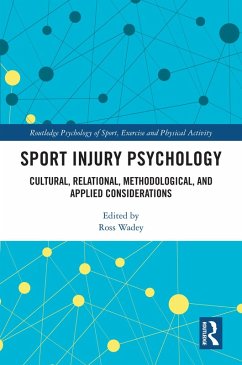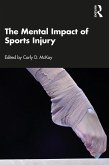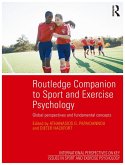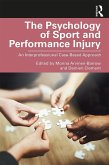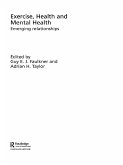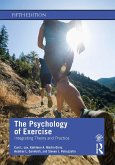Sport Injury Psychology (eBook, ePUB)
Cultural, Relational, Methodological, and Applied Considerations
Redaktion: Wadey, Ross
42,95 €
42,95 €
inkl. MwSt.
Sofort per Download lieferbar

21 °P sammeln
42,95 €
Als Download kaufen

42,95 €
inkl. MwSt.
Sofort per Download lieferbar

21 °P sammeln
Jetzt verschenken
Alle Infos zum eBook verschenken
42,95 €
inkl. MwSt.
Sofort per Download lieferbar
Alle Infos zum eBook verschenken

21 °P sammeln
Sport Injury Psychology (eBook, ePUB)
Cultural, Relational, Methodological, and Applied Considerations
Redaktion: Wadey, Ross
- Format: ePub
- Merkliste
- Auf die Merkliste
- Bewerten Bewerten
- Teilen
- Produkt teilen
- Produkterinnerung
- Produkterinnerung

Bitte loggen Sie sich zunächst in Ihr Kundenkonto ein oder registrieren Sie sich bei
bücher.de, um das eBook-Abo tolino select nutzen zu können.
Hier können Sie sich einloggen
Hier können Sie sich einloggen
Sie sind bereits eingeloggt. Klicken Sie auf 2. tolino select Abo, um fortzufahren.

Bitte loggen Sie sich zunächst in Ihr Kundenkonto ein oder registrieren Sie sich bei bücher.de, um das eBook-Abo tolino select nutzen zu können.
Critical Perspectives in Sport Injury Psychology aims to engage in more intense debates about sport injury psychology by turning a more critical eye towards it. It challenges the field's traditions and practices by drawing from different disciplines, paradigms, and theories.
- Geräte: eReader
- ohne Kopierschutz
- eBook Hilfe
- Größe: 4.5MB
Andere Kunden interessierten sich auch für
![Physical Activity in Natural Settings (eBook, ePUB) Physical Activity in Natural Settings (eBook, ePUB)]() Physical Activity in Natural Settings (eBook, ePUB)39,95 €
Physical Activity in Natural Settings (eBook, ePUB)39,95 €![Applied Exercise Psychology (eBook, ePUB) Applied Exercise Psychology (eBook, ePUB)]() Applied Exercise Psychology (eBook, ePUB)75,95 €
Applied Exercise Psychology (eBook, ePUB)75,95 €![The Mental Impact of Sports Injury (eBook, ePUB) The Mental Impact of Sports Injury (eBook, ePUB)]() The Mental Impact of Sports Injury (eBook, ePUB)39,95 €
The Mental Impact of Sports Injury (eBook, ePUB)39,95 €![Routledge Companion to Sport and Exercise Psychology (eBook, ePUB) Routledge Companion to Sport and Exercise Psychology (eBook, ePUB)]() Routledge Companion to Sport and Exercise Psychology (eBook, ePUB)75,95 €
Routledge Companion to Sport and Exercise Psychology (eBook, ePUB)75,95 €![The Psychology of Sport and Performance Injury (eBook, ePUB) The Psychology of Sport and Performance Injury (eBook, ePUB)]() The Psychology of Sport and Performance Injury (eBook, ePUB)42,95 €
The Psychology of Sport and Performance Injury (eBook, ePUB)42,95 €![Exercise, Health and Mental Health (eBook, ePUB) Exercise, Health and Mental Health (eBook, ePUB)]() Exercise, Health and Mental Health (eBook, ePUB)49,95 €
Exercise, Health and Mental Health (eBook, ePUB)49,95 €![The Psychology of Exercise (eBook, ePUB) The Psychology of Exercise (eBook, ePUB)]() Curt L. LoxThe Psychology of Exercise (eBook, ePUB)75,95 €
Curt L. LoxThe Psychology of Exercise (eBook, ePUB)75,95 €-
-
-
Critical Perspectives in Sport Injury Psychology aims to engage in more intense debates about sport injury psychology by turning a more critical eye towards it. It challenges the field's traditions and practices by drawing from different disciplines, paradigms, and theories.
Dieser Download kann aus rechtlichen Gründen nur mit Rechnungsadresse in A, B, BG, CY, CZ, D, DK, EW, E, FIN, F, GR, HR, H, IRL, I, LT, L, LR, M, NL, PL, P, R, S, SLO, SK ausgeliefert werden.
Produktdetails
- Produktdetails
- Verlag: Taylor & Francis eBooks
- Seitenzahl: 272
- Erscheinungstermin: 22. November 2020
- Englisch
- ISBN-13: 9781000208481
- Artikelnr.: 60349924
- Verlag: Taylor & Francis eBooks
- Seitenzahl: 272
- Erscheinungstermin: 22. November 2020
- Englisch
- ISBN-13: 9781000208481
- Artikelnr.: 60349924
- Herstellerkennzeichnung Die Herstellerinformationen sind derzeit nicht verfügbar.
Ross Wadey PhD is an Associated Professor at St Mary's University, UK.
Introduction: Challenging the Status Quo of Sport Injury Psychology
1. Narratives Matter! Storying Sport Injury Experiences
2. Sport Media Research: Examining the Benefits for Sport Injury Psychology
and Beyond
3. Gender Matters: How can Sociocultural Perspectives on Pain, Injury and
the Sporting Body Benefit Future Research on Sport Injury Psychology?
4. Sport-Related Concussion: Critical Reflections, Methodological Musings,
and New Research Directions
5. Pain and Injury: From the Unidimensional to the Multidimensional
6. 'Slim-to-Win' to Injury: How Swimmers' are Engaging with 'Health Risk'
Culture due to Entrenched Body Ideals
7. "What Does not Kill us, Makes Us Stronger": Do Injured Athletes Really
Experience Growth?
8. Time to Re-Examine Injured Athletes Emotional Responses
9. Physiotherapist-Injured Athlete Relationship: Towards a Cultural and
Relational Understanding
10. Guilt Experienced by Coaches Following Athlete Injury
11. My Daughter's Injured Again! I Just Don't Know What to do Anymore
12. But We've Always Done it this Way: The Future of Qualitative Injury
Research
13. Experimental Psychological Response to Injury Studies: Why so Few?
14. Introducing Knowledge Translation into the Field of Sport Injury
Psychology: The Art of Improving Research Uptake in Practice
15. "But it is Bad!" "Yes, but is it Really as Bad as you Have Indicated
Here?" "Absolutely!" Challenging Injured Athletes' Irrational Beliefs: Not
a Straightforward Exercise
16. Less Control, More Flexibility: Using Acceptance and Commitment Therapy
with Injured Athletes
17. "This is the Final Jump," I respond. Why, Why, do I Utter Those Words?"
Storytelling in Sport Injury Rehabilitation
18. Textbooks Don't Tell It Like It Is: Tales from Working in the Field
with Injured Athletes
19. Three Decades Later: Looking Back to Look Forward
1. Narratives Matter! Storying Sport Injury Experiences
2. Sport Media Research: Examining the Benefits for Sport Injury Psychology
and Beyond
3. Gender Matters: How can Sociocultural Perspectives on Pain, Injury and
the Sporting Body Benefit Future Research on Sport Injury Psychology?
4. Sport-Related Concussion: Critical Reflections, Methodological Musings,
and New Research Directions
5. Pain and Injury: From the Unidimensional to the Multidimensional
6. 'Slim-to-Win' to Injury: How Swimmers' are Engaging with 'Health Risk'
Culture due to Entrenched Body Ideals
7. "What Does not Kill us, Makes Us Stronger": Do Injured Athletes Really
Experience Growth?
8. Time to Re-Examine Injured Athletes Emotional Responses
9. Physiotherapist-Injured Athlete Relationship: Towards a Cultural and
Relational Understanding
10. Guilt Experienced by Coaches Following Athlete Injury
11. My Daughter's Injured Again! I Just Don't Know What to do Anymore
12. But We've Always Done it this Way: The Future of Qualitative Injury
Research
13. Experimental Psychological Response to Injury Studies: Why so Few?
14. Introducing Knowledge Translation into the Field of Sport Injury
Psychology: The Art of Improving Research Uptake in Practice
15. "But it is Bad!" "Yes, but is it Really as Bad as you Have Indicated
Here?" "Absolutely!" Challenging Injured Athletes' Irrational Beliefs: Not
a Straightforward Exercise
16. Less Control, More Flexibility: Using Acceptance and Commitment Therapy
with Injured Athletes
17. "This is the Final Jump," I respond. Why, Why, do I Utter Those Words?"
Storytelling in Sport Injury Rehabilitation
18. Textbooks Don't Tell It Like It Is: Tales from Working in the Field
with Injured Athletes
19. Three Decades Later: Looking Back to Look Forward
Introduction: Challenging the Status Quo of Sport Injury Psychology
1. Narratives Matter! Storying Sport Injury Experiences
2. Sport Media Research: Examining the Benefits for Sport Injury Psychology
and Beyond
3. Gender Matters: How can Sociocultural Perspectives on Pain, Injury and
the Sporting Body Benefit Future Research on Sport Injury Psychology?
4. Sport-Related Concussion: Critical Reflections, Methodological Musings,
and New Research Directions
5. Pain and Injury: From the Unidimensional to the Multidimensional
6. 'Slim-to-Win' to Injury: How Swimmers' are Engaging with 'Health Risk'
Culture due to Entrenched Body Ideals
7. "What Does not Kill us, Makes Us Stronger": Do Injured Athletes Really
Experience Growth?
8. Time to Re-Examine Injured Athletes Emotional Responses
9. Physiotherapist-Injured Athlete Relationship: Towards a Cultural and
Relational Understanding
10. Guilt Experienced by Coaches Following Athlete Injury
11. My Daughter's Injured Again! I Just Don't Know What to do Anymore
12. But We've Always Done it this Way: The Future of Qualitative Injury
Research
13. Experimental Psychological Response to Injury Studies: Why so Few?
14. Introducing Knowledge Translation into the Field of Sport Injury
Psychology: The Art of Improving Research Uptake in Practice
15. "But it is Bad!" "Yes, but is it Really as Bad as you Have Indicated
Here?" "Absolutely!" Challenging Injured Athletes' Irrational Beliefs: Not
a Straightforward Exercise
16. Less Control, More Flexibility: Using Acceptance and Commitment Therapy
with Injured Athletes
17. "This is the Final Jump," I respond. Why, Why, do I Utter Those Words?"
Storytelling in Sport Injury Rehabilitation
18. Textbooks Don't Tell It Like It Is: Tales from Working in the Field
with Injured Athletes
19. Three Decades Later: Looking Back to Look Forward
1. Narratives Matter! Storying Sport Injury Experiences
2. Sport Media Research: Examining the Benefits for Sport Injury Psychology
and Beyond
3. Gender Matters: How can Sociocultural Perspectives on Pain, Injury and
the Sporting Body Benefit Future Research on Sport Injury Psychology?
4. Sport-Related Concussion: Critical Reflections, Methodological Musings,
and New Research Directions
5. Pain and Injury: From the Unidimensional to the Multidimensional
6. 'Slim-to-Win' to Injury: How Swimmers' are Engaging with 'Health Risk'
Culture due to Entrenched Body Ideals
7. "What Does not Kill us, Makes Us Stronger": Do Injured Athletes Really
Experience Growth?
8. Time to Re-Examine Injured Athletes Emotional Responses
9. Physiotherapist-Injured Athlete Relationship: Towards a Cultural and
Relational Understanding
10. Guilt Experienced by Coaches Following Athlete Injury
11. My Daughter's Injured Again! I Just Don't Know What to do Anymore
12. But We've Always Done it this Way: The Future of Qualitative Injury
Research
13. Experimental Psychological Response to Injury Studies: Why so Few?
14. Introducing Knowledge Translation into the Field of Sport Injury
Psychology: The Art of Improving Research Uptake in Practice
15. "But it is Bad!" "Yes, but is it Really as Bad as you Have Indicated
Here?" "Absolutely!" Challenging Injured Athletes' Irrational Beliefs: Not
a Straightforward Exercise
16. Less Control, More Flexibility: Using Acceptance and Commitment Therapy
with Injured Athletes
17. "This is the Final Jump," I respond. Why, Why, do I Utter Those Words?"
Storytelling in Sport Injury Rehabilitation
18. Textbooks Don't Tell It Like It Is: Tales from Working in the Field
with Injured Athletes
19. Three Decades Later: Looking Back to Look Forward
